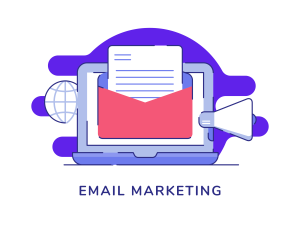17.02.2023
WordPress Marketing
7 Must-Have Email Marketing Strategies for Your WordPress Website
READING TIME: MIN
Table of Content
Email marketing is a crucial component of any successful online business strategy, and having a solid plan in place can help you reach and engage your target audience effectively.
This blog will discuss your WordPress website’s seven must-have email marketing strategies. These strategies have been proven to drive results, and implementing them can help you create a highly effective email marketing campaign that delivers results for your business.
Whether new to email marketing or looking to improve your existing efforts, this blog has something for everyone.
Let’s get started!

Why is Email Marketing Important?
Email marketing allows businesses to communicate with their target audience directly. It offers a cost-effective and measurable way to reach customers, build brand awareness, drive traffic, generate leads, and ultimately boost sales.
Email also allows for personalization and targeted campaigns, increasing the likelihood of customer engagement and conversions. Additionally, email marketing tools are widely used and accessible, making them valuable in any digital marketing strategy.
7 Email Marketing Strategies for Your WordPress Website

1. Building a strong email list
A robust email list is crucial for businesses to effectively reach out to their customers and potential clients. There are several ways to grow your email list and make it more robust. Here’re two crucial ways to make a note of this:
Opt-in forms and pop-ups
This is a common way of collecting email addresses from website visitors. Opt-in forms can be integrated into the website and placed strategically in the footer, sidebar, or above the fold.
Pop-ups can also capture emails when visitors are about to leave the site. These forms must be well-designed, with clear and concise language, to encourage visitors to provide their email addresses.
Lead magnets
A lead magnet is a free resource or incentive a business offers visitors in exchange for their email addresses. Lead magnets can be in e-books, webinars, checklists, and more. These resources must be valuable and relevant to the target audience so visitors are motivated to provide their email addresses.

2. Personalization
As a business owner, you know that personalization is vital to creating a positive customer experience. You want to give your customers the best possible experience, sending them emails tailored to their needs and interests.
But the more people you have on your email list, the harder it can be to personalize every message you send. However, here are some simple ways to ensure every email feels like it’s been written just for your customer:
- Segmenting is the process of dividing recipients into groups based on shared characteristics or behaviors. By grouping similar recipients and targeting each group with different messages, you can deliver a more personalized experience while saving yourself time by only having to create one message instead of several different ones.
- Include the recipient’s name in the subject line of your email. You can also include the company’s name if it’s relevant to the email content.
- Use dynamic content that changes based on previous interactions with the subscriber (for example, if they’ve purchased something from you before). This can include product recommendations, personalized offers, and other relevant information.
3. Mobile optimization
A site’s mobile optimization is an essential factor in its overall success. Why? Because — as you may have guessed — more and more people are using their phones to browse the web these days, and that means that if your site isn’t optimized for mobile devices, you’re going to miss out on a lot of potential traffic.
It’s crucial to ensure your emails are optimized for mobile devices. The best way to do this is by using responsive design, which allows your emails to adapt automatically depending on the device they’re being viewed on. This ensures that your subscribers see an email that looks good no matter what device they’re using—and it also provides that they see an email that loads quickly, so they don’t get frustrated and click away!
Luckily, there are several ways to ensure your emails look as good on mobile devices as on desktops. Here are some simple tips:
- Use short paragraphs and bullet points whenever possible.
- Use lots of white space in your design, so it doesn’t feel cluttered when viewed on smaller screens.
- Ensure all links are clickable and easily read at small sizes (I recommend using underlines rather than bold text).
4. Interactive elements
Email marketing is an excellent way to interact with your customers on a personal level. It’s also a great way to build brand loyalty and encourage repeat purchases, so you must use the right interactive elements in your emails.
Here are three types of interactive elements that can help you improve your email marketing strategy:
Including images
If you want to add a bit of personality to your emails, you can always include images that relate to the content of your emails. This can be done by taking photos yourself or using stock photos.
Adding video
Videos are another way to bring life into your emails and make them more interesting for the reader. You can either record a video or use stock footage from sites like Unsplash and Pexels (both of which offer free downloads).
Using quizzes and surveys
Surveys are a great way to learn more about your audience, and quizzes can incentivize people to read through longer content or watch videos about your business — which means more engagement for everyone involved!
5. Triggered emails
The goal of triggered emails is to get the user to take action that will benefit you, whether coming back to your site or making a purchase.
When someone adds an item to their cart but still needs to complete their order, you can send them a reminder email with options for continuing their purchase. This can be set up using a plugin like WooCommerce abandoned cart. This will allow you to customize your messages and send out multiple reminders at different times if necessary.
If you have an email list of past customers, re-engagement campaigns can be used to get them back into the store. These types of emails don’t have to be about sales — you can use them to send coupons or other marketing materials that will help rekindle customer interest in your products or services.
If you have a customer who has yet to make any purchases for quite some time, send them a reminder about your products or services to win them back as a customer again. You can send these out as soon as someone cancels or stops using your product or service or every couple of months until they’ve finally returned (and hopefully made a purchase).

6. Integrating with social media
Social media integration is excellent for getting more traffic and improving your email marketing.
There are several ways to integrate email marketing with social media. First, you can share your email content on social media. This is an excellent opportunity to promote your brand and build trust through consistent messaging across platforms.
Second, consider adding social media follow buttons to your emails. This will make it easy for people to connect with you across platforms. You can also use these buttons to grow your email list by encouraging people who click the button to subscribe before leaving the site or app.
Third, use social media to grow your email list by sharing posts that direct readers back if they want more information on something they saw the first time; this way, both platforms benefit from each other’s success!

7. Measuring success
The crucial step to successful email marketing is tracking your key metrics. If you need to know how much traffic your site is getting, how many people are signing up for your newsletter, or whether or not the emails are even being read, how can you expect to make any changes that will improve results?
First, you’ll want to track some of the basics:
- How many people have subscribed to your list?
- What percentage of those subscribers open each message?
- What percentage of those who open an email click through on links within it?
Second, you’ll want to track more advanced metrics as well:
- How often do people unsubscribe from the list? And why? Is it because they don’t like what they’re getting from you or because they don’t see it in their inboxes anymore and want no part of anything new?
- Do subscribers respond better when emails are sent out at certain times of day (or week) than others? If so, you must know that your messages aren’t sent out at times when they’ll likely get lost in the shuffle or ignored altogether.
Conclusion
You’ve heard it time and time again: email is the most effective way to connect with prospects and customers, sustain your brand’s reputation, and build a relationship with them. When it comes to email marketing, the more tactics you can use to engage subscribers and foster their loyalty, the better.
All these tips can help make your emails more successful — whether you’re a WordPress website owner looking to start a newsletter or an established business that wants to improve its current email content.
More on The Topic
- Sustainable Growth for WordPress Products
- WordPress for High Traffic Sites: Strategies for Scalability and Stability
- Looking For the Best Email Marketing Strategy? Here Are 5 Tips for WordPress Websites
- Reaching New Heights in WordPress’s Conversion Rate: Sharing Must-Follow Tips
- Content Strategy in WordPress: Yet Another Successful Business Guide
Tags: email campaignemail marketingemail strategytips and tricks
The content of this website is copyrighted and protected by Creative Commons 4.0.







